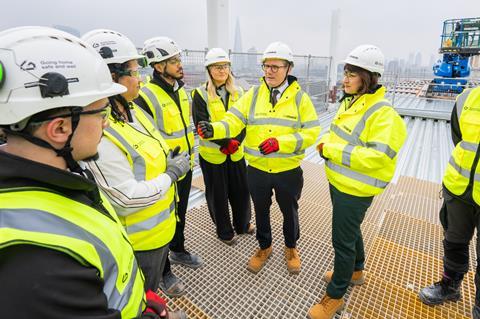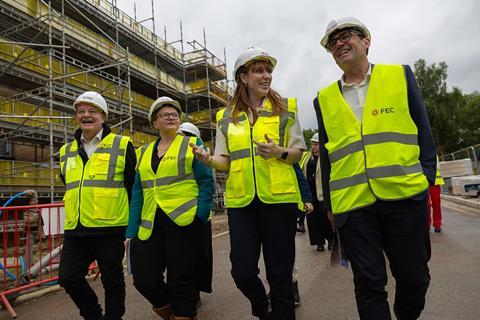In a hurry to get on with things, Labour’s deputy prime minister who is in charge of housing, communities and local government looks like she might dodge the fallout from the Budget that is blunting optimism in construction

Given that one of your party’s slogans in the run-up to this summer’s general election was to “get Britain building again”, it is just as well you have a politician who is taking a high-profile involvement in the built environment right now.
The list of schemes in which Angela Rayner, Labour’s secretary of state for housing, communities and local government for the past six months, has got involved is eclectic.
A housing project in Kent, plans for the new Chinese embassy in London, a data centre in Buckinghamshire, the redevelopment by Marks & Spencer on London’s most famous street and a tower in the Square Mile – all have been touched by the hand of the 44-year-old from Stockport, who also doubles up as deputy prime minister.
There will be, no doubt, more to come but one thing seems certain: Rayner looks to be positioning herself as a friend of builders.
The decisions over M&S and the data centre are testament to that while her intervention on plans to build 8,500 homes in Kent came after local planning officials had recommended that they be refused.
She wants to get stuff done. She’s hands-on. It’s still early days, but she has a lot to offer and could be really good for the industry
Mark Robinson, chief executive, Scape
There may be gripes and grumbles about the Chinese embassy and City tower decisions – this week that scheme’s developer, without naming Rayner, made pointed remarks about its benefits in the wake of the City recommending it for approval – but Rayner is coming across as someone who wants to get cracking and is in a hurry to do it. It is difficult to think of a more high-profile politician since the late John Prescott more than 20 years ago who recognises the importance of the industry and its beneficial impact.
“I really like her,” enthuses Mark Robinson, chief executive of public sector procurement specialist Scape. “She wants to get stuff done. She’s hands-on. It’s still early days, but she has a lot to offer and could be really good for the industry.”
In the lead up to the election, the Labour party leader Keir Starmer and shadow chancellor Rachel Reeves were keen to be seen as being on the side of development. There was a photo opportunity for the pair at Mace’s scheme to build a new headquarters for HSBC near St Paul’s Cathedral in March, while in its manifesto, Labour promised to put building things at the heart of the country’s economic recovery.
Now prime minister, Starmer, in between gloomy talk about the state of the country’s economy, has made headlines with plans to build 1.5 million homes and get 150 infrastructure projects signed off by the end of this parliament.
“We will send a very clear message to the nimbys,” he said last week, “the regulators, the blockers, the bureaucrats, the alliance of naysayers, the people who say Britain can’t do this, we can’t get things done in our country. Well, we say to them, you no longer have the upper hand. Britain says yes.”
While his soundbites get the headlines, it is Rayner who appears to be tasked with getting Britain building.
Her plans to overhaul the planning system will include allowing planning officers to approve applications without permission from committees of councillors if they comply with local plans and the National Planning Policy Framework, the update version of which is coming out today.

Her M&S decision was also hugely symbolic. It had been refused by her predecessor Michael Gove.
He also took an interest in the built environment; before M&S, he had refused plans for the Tulip, a tower scheme by Foster & Partners slated for a site next door to the Gherkin in the City – although, to be fair, he was agreeing with a decision made by London mayor Sadiq Khan to throw it out.
The following year, in 2022, Gove also put the brakes on the redevelopment of the ITV Studios site on London’s Southbank – a legal decision on which has still not been made despite a promise that it would be by the end of last month.
But, along with his critical rhetoric about housebuilders, Gove was seen by many as being anti-developer and, for those in this camp, his decision on M&S’s plan to rebuild its Marble Arch flagship was the high watermark of this position. By giving it the green light, Rayner has planted herself firmly on the other side of the fence.
Robinson, who started on the tools when he was a teenager, says it is up to the industry to repay Rayner’s boldness. “I hope the industry can deliver,” he admits, “but I’m confident that we can. Whatever challenges come up, the industry finds a way of doing it.”
“But”. There is always a but.
While Rayner is being viewed positively, her colleague at Number 11 has not been so well received. Chancellors who increase taxes never are, but the Budget in October caught many on the hop with where the rises to plug the £22bn black hole and so on were coming from.
>> Also read: ��ɫ����TV’s view of 2024: another lost year?
This week, Arcadis said it had put back what it called a full recovery in the sector by a year to 2026. A month before the Budget, it had been predicting a meaningful recovery by the middle of 2025. The national insurance (NI) tax rises were partly to blame for the revision, it said.
Last week, the PMI index also flagged worries that the hikes had dampened firms’ positive outlook for the coming 12 months. Again, the NI rises were partly to blame, the index said.
The chancellor’s tax raid in the Budget dealt a blow to thousands of small businesses, especially construction firms – many of whom are already on a knife edge
Amit Oberoi, executive chairman, the Considerate Constructors Scheme
Amit Oberoi, executive chairman of the Considerate Constructors Scheme, says: “Setting new targets on infrastructure, loosening planning rules and pushing back against blanket local opposition can take you only so far when policies elsewhere are actively harming those firms and contractors needed to build the future that Keir Starmer envisions.
“I understand the need for tough choices to be made to balance the country’s books, but the chancellor’s tax raid in the Budget dealt a blow to thousands of small businesses, especially construction firms – many of whom are already on a knife edge. The decision to raise national insurance contributions could mean more are sent into administration.”

Only time will tell. One way to deal with the rises is to pass them on and Arcadis clearly thinks that this will happen, given it is predicting that project costs will go up by 1%.
Andrew Davies, the chief executive of Kier, which employs 10,000 people, admits the NI rise “will have an impact” but he adds: “We’ll deal with it – that’s what you have to do when you’re running a company. You don’t run away from [issues], you just deal with them.”
The government will be hoping that most of its suppliers will be able to do just that. Because Rayner’s interventions will quickly start to look a little hollow if they cannot.























No comments yet